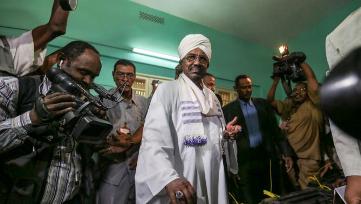Sudan’s Bashir dismisses western criticism over elections
April 23, 2015 (KHARTOUM) – Sudanese president Omer Hassan al-Bashir has rejected recent criticism by troika member states (US, UK and Norway) over the conduct of last week’s elections.

“Restrictions on political rights and freedoms, counter to the rights enshrined in the Sudanese constitution, the lack of a credible national dialogue and the continuation of armed conflict in Sudan’s peripheries are among the reasons for the reported low participation and very low voter turnout,” the statement said.
This prompted Sudan’s foreign ministry to summon the envoys of the three countries along with the EU to condemn the statement calling it “a blatant intervention in the internal affairs of the country”.
Bashir, who addressed the opening session of East African Standby Force (EASF) on Friday, commented for the first time on the Troika statement by noting that 44 political parties participated in the elections which were deemed to be fair and credible by regional and international observers.
“This [position by Troika] will not affect democracy or the process the national dialogue in Sudan,” Bashir said.
Sudan’s election has been boycotted by major opposition parties leading among other reasons to a very low turnout.
The opposition had demanded postponement of polls until the formation of a coalition government to oversee the vote and ensure its fairness.
The final results of the elections will be officially announced on 27 April.
Bashir and his ruling party are expected to win comfortably after more than 25 years in power.
In a related issue, the leader of Liberation and Justice Movement (LJM), Tijani al-Sissi, slammed the troika’s position and asserted that the elections were “excellent, transparent, fair and sound”.
He claimed that the EU position was in retaliation to the refusal of the government to participate in the pre-dialogue meeting in Addis Ababa sponsored by the African Union (AU).
“National dialogue must be conducted inside Sudan,” Sissi said.
LJM, a former Darfuri rebel group that is now allied with the government, contested in the elections and is believed to have secured a handful of seats in state and federal parliament.
Last week, it was revealed that a report drafted by an African Union (AU) panel tasked with evaluating the pre-elections environment in Sudan concluded that it would not be possible to hold credible polls in the East African nation, recommending that the pan-African body not send a monitoring mission.
“The overall political environment is restrictive, which impacted on political participation by other stakeholders, including opposition parties, civil society and the media. Media houses and civil society organisations were barred from discussing issues relating to the conflict in the country and certain political and social topics,” the pre-election assessment mission said in its report submitted to the AU Peace and Security Council (AUPSC) last month.
“Those who ignored this ruling either have their licenses withdrawn or arrested and detained by the National Intelligence and Security Service (NISS). Thus, freedom of expression, association and assembly were generally not respected,” the report adds.
It concluded that that “the necessary conditions and environment for the holding of transparent, competitive, free and fair elections as agreed in the AU principles governing democratic elections have not been satisfied”.
It called for the polls to be postponed in favor of furthering the national dialogue process initiated by Bashir last year on the basis that this would “allow more time for the creation of an enabling environment for credible, transparent and competitive elections”.
The committee recommended that the AU not send an observation mission, saying that doing so “under this circumstance would not be viable and effective and would not contribute to democracy building”.
But the AUSPSC brushed aside the findings and recommendations in the report and decided to send an observation mission headed by former Nigerian president Olusegun Obasanjo.
Obasanjo vouched for the credibility of the elections but stated that the “elections would have been enhanced” if the human rights situation had been improved.
(ST)
